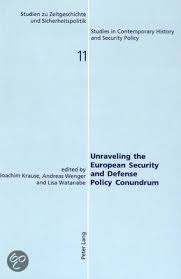Ouvrage collectif
Après avoir donné un bref aperçu de la gamme d’instruments non militaires mis en œuvre par l’UE dans les Balkans, l’accent est mis sur le fait que l’absence d’une composante militaire crédible risque d’affaiblir – sinon saper – l’ensemble des autres aspects.
Il est bien souligné que « la présence européenne actuelle – du début de l’année 2002 – dans les Balkans (80% des 50 000 soldats de l’OTAN étant des Européens) montre qu’un rôle militaire plus fort des Européens dans la région n’est pas une question de l’avenir mais un fait du présent. Néanmoins, l’absence du drapeau de l’Union au-dessus de cette présence européenne indique que la plupart des facteurs faisant obstacle à un rôle militaire plus affirmé sont non pas d’ordre capacitaire mais découlent plutôt de considérations politiques.
La PESD est avant tout une étape logique dans le processus d’intégration européenne : elle préfigure « le passage d’un pouvoir économique vers la puissance politique, l’élaboration progressive d’une dimension stratégique, et par là, l’émergence de l’Europe en tant qu’acteur international à part entière. » En même temps, la PESD est une composante, complémentaire certes – mais absolument indispensable – de l’extraordinairement vaste gamme d’instruments économiques, politiques et diplomatiques dont dispose l’Union. Sans un rôle militaire crédible dans les Balkans, c’est toute la cohérence et l’équilibre de son engagement pour la région qui se trouve remise en cause.
Pour ce qui est du théâtre des Balkans, un aperçu des tentatives précédentes et des défis actuels permet de souligner que ce sont essentiellement des obstacles internes à l’UE –en particulier le manque de volonté politique) qui font obstacle à une mise en œuvre efficace de la PESD. Parmi les exemples : d’innombrables duplications entre Etats-membres (tant qu niveau des capacités qu’à celui des industries) ; visions divergentes sur les relations transatlantiques (division des tâches, degré d’émancipation souhaitée) ; conceptions différentes sur le contenu même de l’intégration (acteur économique, politique, stratégique) ; rivalités et redondances entre piliers de l’UE.
En ce qui concerne les insuffisances des capacités, il convient de remarquer que : « malgré tous les reproches de Washington au sujet du fameux écart des capacités, les efforts européens visant à remédier à cette situation ont souvent rencontré une réaction hostile de la part des Etats-Unis, dès qu’ils ne suivaient pas l’ordre ‘Achetez américain’ ou qu’ils incluaient la possibilité d’une autonomie stratégique réelle (comme c’est le cas de l’A400M ou du système de navigation par satellite Galileo) ».

(In: Unraveling the European Security and Defense Policy Conundrum, ed. J. Krause, A. Wenger, L. Watanabe. Studies in Contemporary History and Security Policy, Vol.11, Bern, 2003)
Tags:
europe de la défense




















